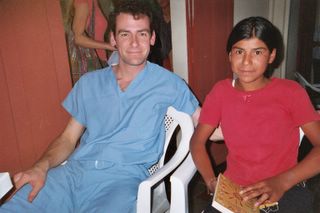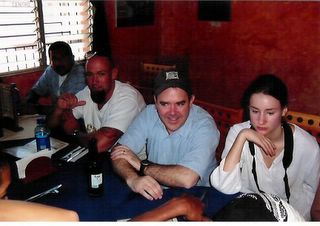I'm So Glad
This blog is dedicated to discerning why I am so glad. This may be of interest to others besides myself . . . or not. It did occur to me that at some future time I will become sad. Should this happen I resolve to close down this site immediately.
3.31.2005
3.25.2005
Morality and Reality
Several important points that got missed alot. One, she was not dying. I repeat
One more thing, I take care of dehydrated people just about every day of my working life. They are not comfortable.
From the NYTimes(via Freerepublic): http://www.freerepublic.com/focus/f-news/1371044/posts
"
NY Times ^ | March 26, 2005 | DAVID BROOKS
OP-ED COLUMNIST
The core belief that social conservatives bring to cases like Terri Schiavo's is that the value of each individual life is intrinsic. The value of a life doesn't depend upon what a person can physically do, experience or achieve. The life of a comatose person or a fetus has the same dignity and worth as the life of a fully functioning adult.
Social conservatives go on to say that if we make distinctions about the value of different lives, if we downgrade those who are physically alive but mentally incapacitated, if we say that some people can be more easily moved toward death than others, then the strong will prey upon the helpless, and the dignity of all our lives will be diminished.
The true bright line is not between lives, they say, but between life and death. The proper rule, as Robert P. George of Princeton puts it, should be, "Always to care, never to kill."
The weakness of the social conservative case is that for most of us, especially in these days of advanced medical technology, it is hard to ignore distinctions between different modes of living. In some hospital rooms, there are people living forms of existence that upon direct contact do seem even worse than death.
Moreover, most of us believe in transcendence, in life beyond this one. Therefore why is it so necessary to cling ferociously to this life? Why not allow the soul to ascend to whatever is in store for it?
The core belief that social liberals bring to cases like Ms. Schiavo's is that the quality of life is a fundamental human value. They don't emphasize the bright line between life and death; they describe a continuum between a fully lived life and a life that, by the sort of incapacity Terri Schiavo has suffered, is mere existence.
On one end of that continuum are those fortunate enough to be able to live fully - to decide and act, to experience the world and be free. On the other end are those who, tragically, can do none of these things, and who are merely existing.
Social liberals warn against vitalism, the elevation of physical existence over other values. They say it is up to each individual or family to draw their own line to define when life passes to mere existence.
The central weakness of the liberal case is that it is morally thin. Once you say that it is up to individuals or families to draw their own lines separating life from existence, and reasonable people will differ, then you are taking a fundamental issue out of the realm of morality and into the realm of relativism and mere taste.
You are saying, as liberals do say, that society should be neutral and allow people to make their own choices. You are saying, as liberals do say, that we should be tolerant and nonjudgmental toward people who make different choices.
What begins as an appealing notion - that life and death are joined by a continuum - becomes vapid mush, because we are all invited to punt when it comes time to do the hard job of standing up for common principles, arguing right and wrong, and judging those who make bad decisions.
You end up exactly where many liberals ended up this week, trying to shift arguments away from morality and on to process.
If you surveyed the avalanche of TV and print commentary that descended upon us this week, you found social conservatives would start the discussion with a moral argument about the sanctity of life, and then social liberals would immediately start talking about jurisdictions, legalisms, politics and procedures. They were more comfortable talking about at what level the decision should be taken than what the decision should be.
Then, if social conservatives tried to push their moral claims, you'd find liberals accusing them of turning this country into a theocracy - which is an effort to cast all moral arguments beyond the realm of polite conversation.
Once moral argument is abandoned, there are no ethical checks, no universal standards, and everything is left to the convenience and sentiments of the individual survivors.
What I'm describing here is the clash of two serious but flawed arguments. The socially conservative argument has tremendous moral force, but doesn't accord with the reality we see when we walk through a hospice. The socially liberal argument is pragmatic, but lacks moral force.
No wonder many of us feel agonized this week, betwixt and between, as that poor woman slowly dehydrates.
E-mail: dabrooks@nytimes.com"














